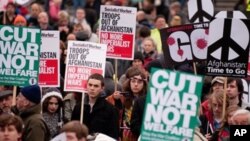Britain has just passed the grim milestone of 100 servicemen killed in Afghanistan this year alone. As NATO leaders meeting in Portugal over the weekend agreed to hand over security to Afghan forces by 2014, protesters back in Britain were calling for an immediate withdrawal of troops.
A stream of around 5,000 people wound its way past London's famous landmarks, demanding that British troops pull out of Afghanistan. There have been many protests against the war in Britain, but what makes this one different is that it was led by Afghan veteran Joe Glenton.
Joe handed back his campaign medal after spending nine months in jail for refusing to return for a second tour. He explains why he led the protest.
"This is again an example of the continued resistance and disgust of people at this war, that's being dragged out as a face-saving measure," he said.
Britain has 9,500 troops in Afghanistan, second only to the U.S.
Since the war began, 347 have been killed; 100 this year alone. The human toll is leading to growing public calls for the troops to withdraw.
Remembrance Services are held every November to honor servicemen and women who've died in combat. This year they were dedicated to those who were killed in Afghanistan.
Prince Harry, who himself served in Afghanistan, attended the opening of this Garden of Remembrance.
Alongside the 346 others, he planted a cross in the ground for his friend, Lance Corporal of Horse Jonathan Woodgate, who died earlier this year.
Jonathan's father Tony recalled the conversations he'd have with his son while he was serving in Afghanistan.
"I'd try to get out of him what he'd been up to," said Woodgate. "He'd say, 'Just stuff Dad, just stuff.' But now that his workmates as he would refer to them have told me what he got up to he was a hero, absolute."
Support among the public for the British armed forces is high. But polls show over 70 percent of the public believe the war in Afghanistan is unwinnable.
And with Britain facing unprecedented cuts to government spending, many are beginning to question the $8 billion a year cost of the war in Afghanistan.
Conscious of the skeptics back home, British Prime Minister David Cameron, attending the NATO summit in Portugal, offered 2015 as a concrete date for Britain's withdrawal.
"It is if you like a backstop. But let me be clear, it is a deadline and I think the British public deserve a deadline. By 2015 we would have been in Helmand province, the toughest part of Afghanistan, for nine years," the prime minister said.
If British forces do stay that long, there could be many more crosses at the Garden of Remembrance.
Doubts remain over whether the public has the will to go for another five years.
British Public Growing Weary of Afghan War
